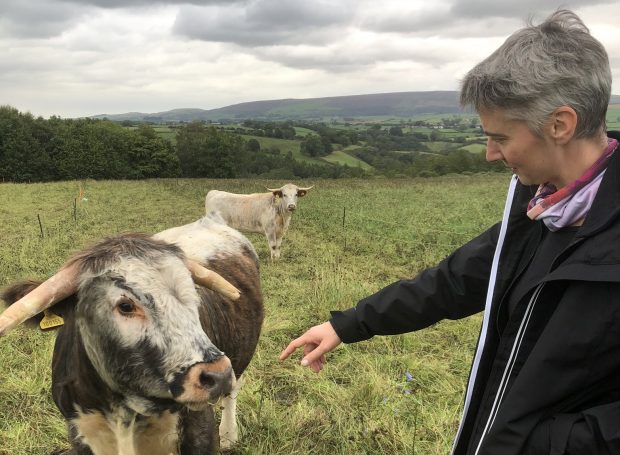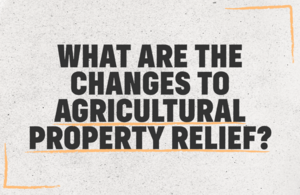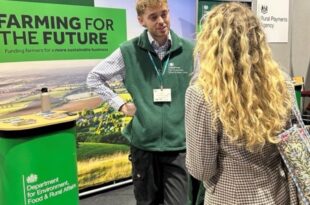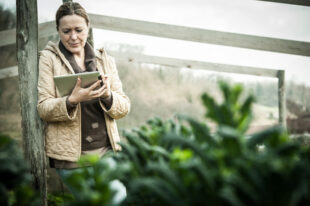
A little over a week ago we published the Agricultural Transition Plan. On page 6, we say:
We will be more flexible and will co-design our policies with farmers and other experts.
"Co-design" is also at the top of our list of guiding principles, on the next page of the plan.
So co-design really matters, and it's really important to the team here at Defra who are working on the transition plan roll-out.
I want to set out what we mean by "co-design", because it's a word we're going to be using a lot in the months and years ahead.
That’s not to say co-design is new to us: we’ve been using it for a while already, for example with our tests and trials work, and through detailed, ongoing engagement with farmers and experts on the design of Environmental Land Management.
We plan to build on that work, expanding and extend the principles and practices of co-design to our whole programme of work, in a more open way, from now on.
Our definition of co-design may change over time, but this is how we see it right now.
Co-design means involving people affected by our work
Co-design is a design approach that actively involves users and stakeholders from the beginning of a project, right through to roll-out.
It means we collaborate with everyone who has an interest to solve real problems with them. We actively seek their input and feedback, based on their lived experience, as we iterate and improve services.
Many government colleagues will be familiar with different names for similar approaches, particularly names like "user-centred design". There's a lot of overlap with those approaches, but co-design puts more emphasis on what we learn from the aggregated opinions of participants.
We respect and value the opinions of people who are living with our policies and systems every day and have experiences, stories, insights and information to share. They know more about what’s worked in the past and what hasn’t, and what we should learn from that.
For example: we are working with people who have deep expertise in different types of farms to make sure our schemes work for all farms.
So it's not just about observing their behaviour when shown a prototype service or work-in-progress.
It's also about asking for their views on how prototypes, works-in-progress and policy decisions will affect their lives. Co-design is a partnership, more than it is a process.
Talking to people helps us learn
One of the things I've learned from speaking to farmers is that there's no such thing as "a typical farm". You can have a wide variety of personal, financial, agricultural and environmental circumstances in just a few square miles; neighbouring farms can have very different experiences.
It's important that we listen to as many voices and views as possible.
We cannot promise to make everyone happy, all of the time. But co-design helps us understand more of those individual circumstances, and respond as best we can.
It’s also a useful way to involve many different sorts of people, with different interests. Of course we’ll be talking to farmers, but not just farmers. There are many others who will be affected by agricultural transition, such as landowners, inspectors, vets, advisers, and many more. My colleague Neville Cavendish, Head of Co-design for the Future Farming and Countryside Programme (Defra), will have more to say about this in another blog post soon.
Building faster and building better
Co-design helps us move faster: from the point that we identify a problem, to our ability to stand up a prototype and begin to test and learn. Co-designing with people helps us understand the real-world impact of a decision. The earlier we can involve them in the process, the sooner we learn and the sooner we can work on improvements.
Co-design also helps us build better: if we don’t meaningfully involve our users in our work, we will risk building things that don’t work for them. We might fail to solve real problems, missing things and messing things up. Getting people involved in co-design doesn't just help us spot what's wrong, it also helps us find the right improvements.
Co-design can feel scary at first
Introducing co-design can raise expectations that we might not be able to meet. But it also helps us understand the perspectives of people affected by our work.
So there's a balance to strike. We strongly believe that co-design is the right approach, and that using it will help us avoid a lot of pitfalls along the way. But it's not a panacea, it won't solve every problem.
We've already started running co-design sessions, and we’ll tell you more about some of them in another blog post soon. There are many more sessions planned in 2021. Keep an eye on this blog for more details.






 The
The 
13 comments
Comment by JAMES Moon posted on
Hopefully co- design will shorten the process which normally takes 2 years to get an application process farmer friendly. Any application should be done without the need for hours of consultancy from advisors just a helping hand.
Comment by Chris Dennis posted on
Thanks for taking the time to comment on the blog James. You’ve raised an important point; making our systems and services more user friendly is exactly why we want to co-design them with the people that use them. If you have thoughts on how we can make our application processes more accessible and less burdensome for farmers, we’d love to hear your ideas. You can drop our Co-design team an email using the address above.
Comment by JAMES Moon posted on
Hopefully I am on the list for co design. As a farmer and farm consultant the present system for Basic Payments could be used on an annual basis I to keep track of stewardship schemes better than the 5 year schemes Most farmers forget which fields are which for a 5 year scheme. Also it gives tenants on shorter tenancies the chance to participate.
Comment by Viv Lewis posted on
Is it really possible to do genuine co-design in a pandemic and lockdown?
It seemes to me what we are getting is managed and controlled design and managed and controlled consultation. Our views are sought on the near final design/protypes, but we have no idea whether we are listened to and our ideas taken on board as there is no feedback. Its feels neither inclusive nor participative at the moment.
Comment by Chris Dennis posted on
Hi Viv. Thanks for visiting the blog and commenting. Our recent workshops have shown us that co-design in a pandemic is possible. We've found that working online with digital tools can actually enhance it. For example, we're able to include more people from all over the country in the same 'room' to talk farming policy! We're still learning as we go, adapting to working remotely and making sure there are a range of ways for people to participate. As we expand our use of co-design out across the programme, we want to make sure we’re getting it right, so we really value your feedback.
Different parts of the programme are at different stages of delivery and so the extent and nature of co-design work varies. Regardless of the area or stage of delivery, we want to involve users in the policy design process.
Workshops are just one way of the ways we're doing co-design, so I'm keen to find out more about your experience and get your thoughts on how we can improve. Feel free to use the email in the blog post and I'll make sure I get it.
Comment by Stephen George Norris posted on
I find it difficult to believe the timetable for the reduction in direct payments and the introduction of public good payments.
while the reduction in direct payments has already started which will result in a direct reduction in the bottom line and profitability the replacement scheme to replace some or all of the reduction in income is only just in the early stages of discussion and formulation!
During the current pandemic while most industries have received aid British farming is rewarded with seeing their is bread on the table with an immediate cut in income.
shortly the reduction in payments under the current system should be delayed until the replacement scheme is ready for roll out.
Comment by Sarah Stewart posted on
Hi Stephen,
All funding released from reductions to 2021 Direct Payments is being recycled into more Countryside Stewardship agreements, Higher Level Stewardship extensions and other schemes.
The Countryside Stewardship scheme opened an application window on 9 February 2021. We’re now inviting farmers to express an interest in joining the Sustainable Farming Incentive pilot. The window to register your interest opened on 15 March 2021 and closes 11 April 2021. We will also be offering new productivity support.
Farmers will be able to apply for grants to help them invest in equipment and technology and boost their productivity under the Farming Investment Fund which is planned to launch in September 2021 Defra is carrying out a grant funding project to provide resilience support to farmers and land managers in England to help them prepare for the agricultural transition.
The grant application process for the next round of funding (interim phase) is planned to open at the end of March.
Comment by J McKendree posted on
True co-design requires the key stakeholders to have a seat at the table making the decisions in partnership. So far, and I may be wrong, it seems that Defra have been having a lot of good one-off conversations, but are there, for instance, farmers/farmer network/conservation/agrifood representatives paid and seconded to the Defra committees that are making the decisions, particularly at ministerial and under-secretary level? Do you have people experienced in innovative participatory methods working directly with stakeholders? I have seen a number of webinars and in-person group activities, as well as written consultations, but what is happening on the farm, aside from the Test & Trials which will only get certain types of farmer involved? Do the Defra teams working on aspects of fertiliser, soil health, animal welfare, etc have the time and resources to get out there with the practitioners and farm advisors on the ground and establish relationships?
Comment by Sarah Stewart posted on
Hi J, thanks for visiting and for your comment. We agree - the success of our co-design activity (and indeed, the success of the programme as a whole) depends on involving those who use, access or deliver our services and schemes. Policy design is always improved by understanding needs, experiences and problems for whom that policy affects.
To that end, we take advice from industry on all areas of the programme at every stage: before, during and after new policy is designed and new schemes open. My engagement colleagues speak to representative bodies and membership organisations regularly. We’re developing relationships with businesses and intermediaries that farmers trust too, such as vets and agronomists to help us share our plans and get a broader range of views.
We’re in the first year of a 7-year transition period so we’re working hard to include the right people and identify the right time to have those conversations.
Our co-design approach includes a range of methods, including User-Centered Design, user research, usability testing, behavioural insights, design workshops and trials. This is alongside our more traditional engagement through roundtable discussions, workshops and webinars. Our virtual farm visits are another way for farmers to share their insights with policymakers (we blogged about this a few weeks ago).
We have a great team made up of User-Centred Design professionals, those with experience in co-design as well as other participatory methods and design approaches.
I hope this is helpful. If there is an area or subject you think would benefit from a further blog post, do let me know. If you’d like to get involved with our co-design work, email ffcpcodesign@defra.gov.uk. Best wishes, Sarah
Comment by Christine posted on
Has anyone on the sustainable farming incentive pilot given feedback yet ?
I haven't had the opportunity yet despite signing up for co design.
The new SFI 2022 is supposed to be based on pilot members feedback.
Comment by John Calder posted on
Christine, you should tell me your SFI pilot experince to date. I am determined to make codesign work (despite disappojntkng results so far). Emakl me at jccalder@gmail.com
Comment by Matthew posted on
I like this concept. I also note that in a DEFRA policy document "Farming is Changing" from last year there was mention that "Engagement with the environment" was being encouraged. Can you please point me towards further information about how & what engagement is being encouraged ? If, for example, I was to run a small group Parent & Toddler session occasionally on land currently designated as agricultural, with an emphasis on learning about nature & environmental sustainability, while spending quality time together as a family outside, would this be encouraged or even supported in any concrete way? Many thanks.
Comment by The Team posted on
Hi Matthew,
Long answer incoming!
The government’s 25 Year Environment Plan sets out its ambition to connect more people from all ages and backgrounds with the natural environment. We recognise the role that green spaces play in the nation’s wellbeing and are committed to safeguarding and improving access.
Increasing access into the countryside, heritage and engagement is supported by schemes like Farming in Protected Landscapes (you can learn more under the 'Quick links' sections on the right hand side of the site) and Countryside Stewardship.
Under the Countryside Stewardship scheme, funding is available to allow school pupils and care farming clients to visit the farm farms to build understanding about farming, the environment and food production, through the scheme’s Mid Tier and Higher Tier offers. Applicants can also access a grant for training for educational access training. This year, we have also introduced a supplement to provide public access to woodlands. Amongst other things, this will provide more educational opportunities. The CS scheme opened for another round of applications on 8 February for agreements starting 1 January 2023.
We are also considering how to maintain investment in access and engagement as part of future schemes, such as our new environmental land management schemes. For example, funding the creation of new paths, such as footpaths and bridleways to provide access for pedestrians, horse riders and cyclists. Later this year we will work with stakeholders, farmers and others to determine the specific land management actions that will be supported for access and engagement.
The Sustainable Farming Incentive will start with three standards in 2022. The scheme will expand each year, with the full set of standards in place by 2025. The list of indicative standards and levels can be found on GOV.UK (or you can find them under 'Quick links' on the right hand side of this page). These standards may change based on feedback from farmers and others.
The government supports positive educational agricultural opportunities that third party providers are delivering such as Linking Environment and Farming LEAF’s Education portfolio. LEAF delivers resources and activities for schools and farmers with the aim of improving food and farming experiences for the younger generation.
Hope this helps,
The Team